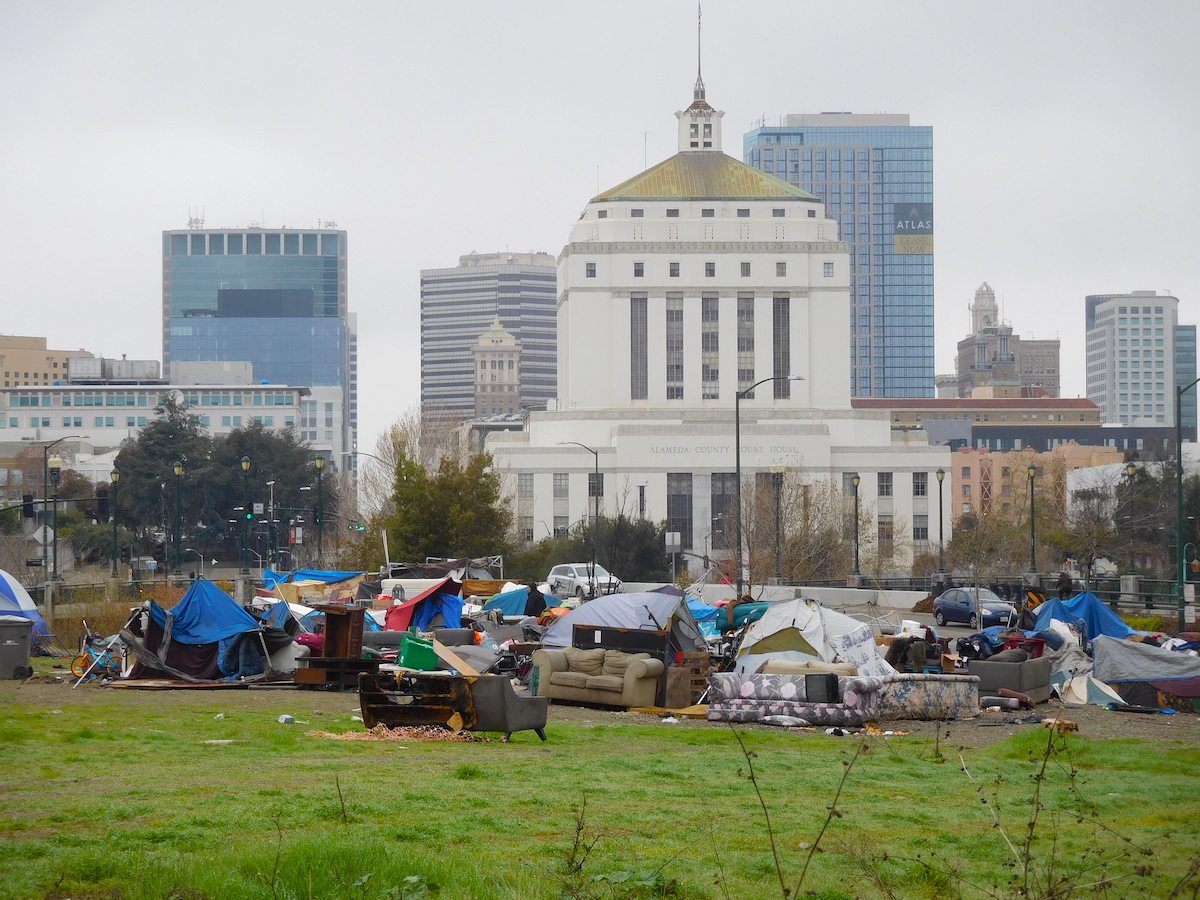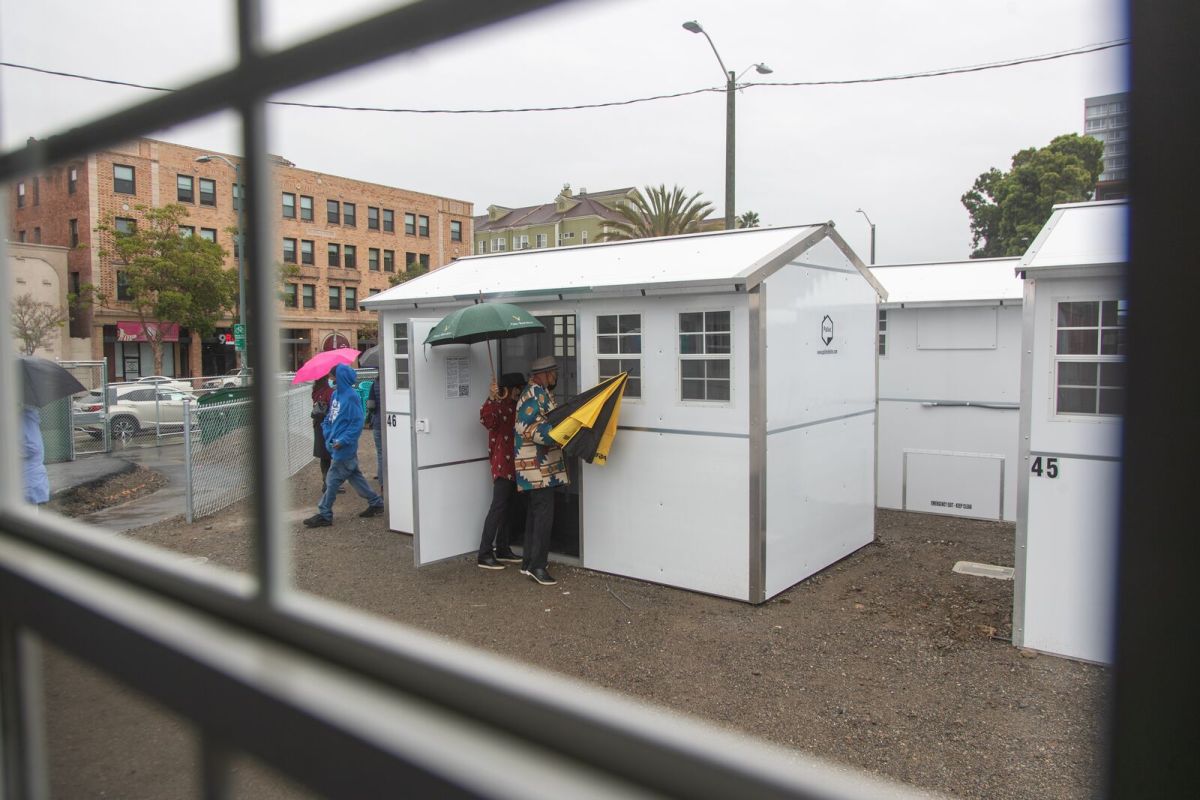When the Lakeview Village tiny-home community opened on a rainy day in November, there was a palpable sense of relief and achievement among city officials and activists who’d long pushed for a community housing program on the vast lot across from Lake Merritt.
At the time, there were still long-delayed plans on the horizon to develop an apartment tower there. But in the meantime, Lakeview Village was poised to provide emergency housing for dozens of people who’d been living in hazardous conditions on the streets.
But in the months since, the city-run site has faced mounting concerns and obstacles. A fire destroyed three of the tiny homes last week, thankfully sparing the people who lived in them. Protesters have criticized differences between two housing programs located on the site. Tensions between city officials and staff have cropped up.
And now, the high school next to Lakeview has sent the city a stern letter, also signed by OUSD school board Director Aimee Eng, laying out safety concerns related to both the official tiny-home program and an unsanctioned homeless camp that’s located on the same lot. The letter, from Dewey Academy, demands the closure of the unsanctioned camp, along with better security at the city’s site.
“We are a caring community who hoped that we would be able to exist harmoniously with the new neighbors without there being a negative effect on our students and campus community,” wrote Dewey staff, students, and Eng, in the letter sent Monday to City Administrator Ed Reiskin. But, they said, “the safety of our students and staff is our utmost concern.”
Long history of controversy at E. 12th Street lot

Debates over how to use the large, grassy parcel owned by the city on E. 12th Street and 2nd Avenue date back years.
In 2015, through a controversial process, the city decided to sell the land to developer UrbanCore, which, along with non-profit developer EBALDC, planned to build a 252-unit market-rate apartment tower at the site, as well as an affordable-housing development with 91 units. From the start, neighborhood activists opposed the project, calling for more affordable units.
Over the next six years, Oakland granted UrbanCore numerous extensions as the developer struggled to line up financing for the project. Meanwhile, a large tent encampment grew on the vacant lot.
Last year, City Council President Nikki Fortunato Bas, who represents the Eastlake area where the lot is located, led a charge to open a temporary emergency shelter on the site as the development process dragged on. In late 2021, Lakeview Village launched, using heated tiny houses from the company Pallet. The structures, used by numerous cities, are built to be assembled quickly for emergency use.
And last month, the City Council officially squashed the UrbanCore deal, opening up new possibilities for the near- and long-term future of the site.
Three ways of living on one site

The E. 12th site actually hosts two separate homelessness programs that coexist side-by-side. Lakeview Village houses around 65 residents and is managed by a nonprofit called Housing Consortium of the East Bay, which provides meals and social services. Most Lakeview residents came from nearby encampments.
Another 16 people live next to them, former residents of a Union Point Park camp that the state ordered the city to close. That smaller program, called Union Point on the Rise, is designed to be a “co-governed encampment,” where residents have a larger role in deciding how their community is run. Initially, they were working with a small organization that advocates for tiny-home villages, called Tiny Logic, but the city canceled that contract a few months ago. Now HCEB co-manages that program with the residents as well.
Since the start, a small but vocal group of protesters who don’t live at Lakeview has been showing up there nearly every day, criticizing what they view as disparities between the two programs, saying the co-governed camp has more power and privileges.
In an interview, Bas said, “I took the chance of co-location of the two programs,” per the city’s request, “and when Tiny Logic’s contract ended I expressed concerns right away about how that program could run without a service provider and manager.” She said she’d like to see the two sites combined into one, more closely resembling the Lakeview program and overseen by one provider and one set of rules.
An unsanctioned tent-and-vehicle camp is still located on the lot, too. Some of the people living there declined offers to move into Lakeview Village.
The letter to the city from Dewey Academy describes challenges mainly associated with that unsanctioned camp. The authors say students at the alternative high school, which serves students who are at risk of not graduating, have been regularly exposed to public nudity, verbal threats, trash on campus, unleashed dogs, and trespassing associated with the camp.
“We were told the encampment at the E. 12th parcel would be removed once the Tiny Village opened and this has not been the case,” the letter-writers said.
The camp, however, is on the city’s schedule for closure this week. According to people associated with the city, there have been previous attempts to close it. The most recent closure was scheduled during the omicron surge, when advocates pressed the city to allow all houseless residents to stay in their homes for their health and safety. The city cleaned up the E. 12th site instead.
The letter from Dewey also refers to issues with the city-run village, which borders the school’s campus. The authors mention problems with trash, as well as disruptive honking from the protests.
Fire adds urgency to concerns

Last week, things came to a head when a March 21 fire obliterated three of the Pallet shelters on the Union Point Park co-governed side, just feet from Dewey’s campus. Nobody was hurt, but five people were displaced, and the incident raised questions about management at the site and the sturdiness of the shelters. The cause of the fire has not been identified, but nearby residents said they heard a “boom” before the homes burst into flames.
Bas released a statement after the fire, blaming city staff for failing to ensure that the co-governed camp is run safely.
The larger tiny-home village “is one of the most promising homeless interventions in the city due to the quality of shelter and services being provided,” Bas said. “I am frustrated by the city administration’s lack of follow-through and action to ensure that the merging of our program with the neighboring [co-governed] community is safe and successful, despite my office raising serious concerns and providing specific recommendations repeatedly over the course of several months.”
Bas maintained that the Pallet shelters themselves are safe, noting they come with fire extinguishers, smoke alarms, and emergency exits.
A city spokesperson did not provide a response by publication time to a request for comment on the Dewey letter or the city’s plans to close the unsanctioned camp this week.
In a March 24 email to Bas, which was obtained by The Oaklandside, Reiskin, the city administrator, said, “I fully understand your frustration, and am committed to getting issues stabilized, resolved, and on a sustainable course asap.”
Residents: ‘It’s better than nothing’

Despite the tensions swirling around the program, for some residents of the Lakeview village, their stay there feels uneventful and familiar.
“It’s just like every other Tuff Shed, just with a different name and different boxes they put us in,” quipped Lakeview resident Mouangjoi Tracy Saelee, referring to Oakland’s “Community Cabin” shelter sites.
“It’s better than nothing,” said Tyri Watson, another resident, mentioning the meals provided to residents.
Saelee, who was previously living outside, further east on E. 12th Street, said she’s grateful that her Lakeview case manager seems to work hard and care about her future. But both she and Watson said they wished there were more mental health services on-site, saying many people need more than shelter to survive.
Neither Saelee nor Watson said they felt very concerned about the differences between their program and the co-governed camp, but Watson said it can feel challenging to be subjected to the decisions and policies of management at his site.
“Most of the folks here are people of color, so they’re not moving from a place of power,” he said.
“Everything is run by the city, and the power is with city officials,” added Saelee.

